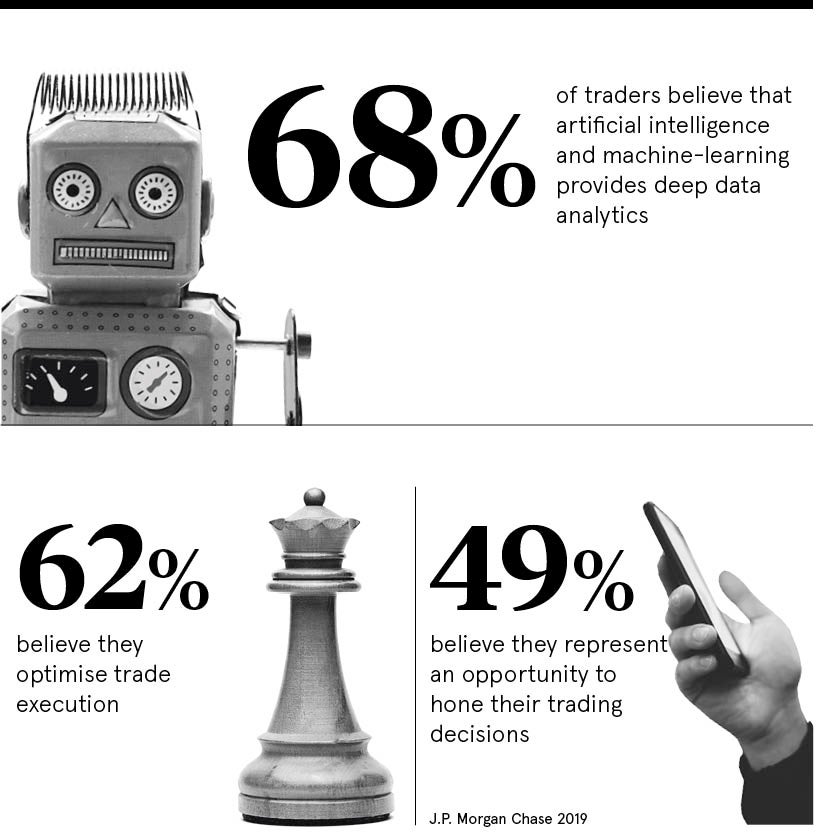Analysing and attempting to predict stock patterns and movements is a game as old as stock exchanges themselves, but in recent decades the sophistication of these methods has grown exponentially.
For today’s investor, technical and fundamental analysis has become an invaluable tool, so much so that leading proponents have become household names, such as the so-called Oracle of Omaha, Warren Buffet. Yet the rise of new technologies, notably artificial intelligence (AI) and deep-learning algorithms, promise the potential to automate this process fully at a speed and rate of success far beyond the reach of human capacity.
Though it is very hard to replace the expertise that an experienced trader has gained, an accurate prediction algorithm can directly result into high profits
Despite concerns about the limitations of these technologies, is the future of stock market predictions and forecasting going to be driven primarily by machine-learning or will the more traditional forms of analysis continue to play a vital role?
Analysts predict tech will take over
In a recent project by the trading company IG, 13 of its financial writers and analysts submitted predictions describing what trading technology might look like in the year 2069. Their expectation was that in 50 years’ time, technical analysis will have become so advanced that algorithms will be able to highlight opportunities to a trader automatically and will be able to recommend trading strategies based on the analysis these algorithms have carried out.
According to IG, the big problem with the current form of algorithmic trading is that it requires constant monitoring and back-testing to ensure the algorithms are working correctly. “By 2069, however, trading algorithms are predictive and can automatically find a range of opportunities, each with a different probability of success,” the report predicts.
Yet, although algorithms can also produce swift analysis and have been very effective over the last 15 years or so, they remain limited by the logic that is built into the algorithm in the first place, counsels Matthew Key, head of customer innovation, global banking and financial markets, at BT.
“Machine-learning, on the other hand, has the ability to improve over time and should be part of any trading environment,” he says. “These techniques also help with the speed of transactions and recent evidence shows machine-learning-based funds have higher returns than other options.”
However, Mr Key warns that any technology-led trading should be supervised by people, as opposed to a computer, because this will add another level of interpretation and context to the trading activity.
Algorithms are not infallible
In fact, most stock traders now depend on intelligent trading systems of one form or another to help predict prices based on various situations and conditions. Stock prices are also considered to be very dynamic and susceptible to quick changes, says Samuel Leach, director of Samuel and Co Trading.
Mr Leach adds: “Though it is very hard to replace the expertise that an experienced trader has gained, an accurate prediction algorithm can directly result into high profits for investment firms, indicating a direct relationship between the accuracy of the prediction algorithm and the profit made from using the algorithm.” In addition, he argues that the use of mathematics and algorithms eliminates a big problem all of us share, namely emotions.
Even so, algorithms are still only able to make predictions based on the data available, says Mr Leach. “Take Brexit, for example, it has not been seen before and therefore algorithms do not know what to predict,” he explains.
“However, they learn over time. A lot of pieces are simply left out when creating a forecast, the noise is separated from the relevant data, but still this algorithm gives you a good idea of existing opportunities. Combined with other forms of stock analysis, the algorithm is an additional tool in making clever investment decisions.”
Investing will always need some human involvement
Yet according to Tim Kane, research fellow at the Hoover Institution, there are a number of lessons to be learnt from how such technologies have been applied in other areas.
For example, the way sports stars are now recruited in the United States has also changed and evolved with the application of data. But while it has been revolutionary, it has not replaced human involvement.
Dr Kane says: “The human ability to notice patterns or to decide which patterns make sense will always be critical. There has always been a fear that machines were going to take our place or take our jobs, but I believe this thinking is fundamentally flawed.”
So although he expects the application of big data and AI will be revolutionary, there is always the danger AI will still need a human driver or a human partner.
“I wouldn’t trust my investment portfolio entirely to AI,” Dr Kane concludes. “Some funds do, but I expect they will have good days and bad days. If anything, computers have given us an ability to make insights that equity analysts alone weren’t capable of back in 1919. That will, I think, make the economy grow faster, but it will probably be coupled with a boom in employment in the financial sector.
“The efficient allocation of capital is key to capitalism, so I believe we’ll see a boom in this industry.”
Analysts predict tech will take over
Algorithms are not infallible

